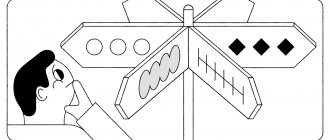The word “egoist” in everyday understanding has a negative connotation. But in psychology, a healthy dose of egoism is considered not only acceptable, but also obligatory. This is an attribute of a person as an individual: normally, everyone acts based on their own interests and in their own favor. An important difference between healthy and unhealthy egoism is taking into account the interests of other people.
We will further discuss unhealthy selfishness, when a child neglects the interests and needs of others to please himself. If this behavior is not corrected in time, it will become the basis of the personality and nothing can be done.
When they talk about unhealthy selfishness in the younger generation
Up to a certain point, up to about 3-4 years, the personality is little noticeable and rather stereotypical. While a person is being formed, there are some rudiments of character, but nothing more. During this period, it is difficult to detect signs of selfishness. And there is little point in this: in the first three years of life, the child is not yet able to learn norms of behavior, moral categories and values. He just has to study and “absorb” all this. In the early period, he is selfish by nature, but there is no malicious intent here. This is fine.
After 4 years the signs become obvious if you look closely.
- Tendency to manipulate
Typical trait. At the stage of approximately 6-7 years, the egoist cannot consciously manipulate. He acts intuitively, on a subconscious level. For now, these are the simplest actions: putting pressure on pity, “butting heads,” etc. Gradually the realization comes: I do X, my parents do Y, and I get what I want. The awareness of those actions that led to a positive result begins. If you do nothing, manipulation will become a habit. An egoist will use them as the main way of interacting with people. This will make things worse for him in the future.
- A selfish child considers only his own interests
A healthy egoist acts in his own interests with an eye on the interests of others. This is fine. A child who is self-obsessed sees only his own interests.
- Self-obsession
“I” as the center and measure of everything. In children, this trait takes on hypertrophied forms. If an adult can hide under a guise, disguise or restrain his impulses and real thoughts, children in their early and even later years are not capable of this. You can find strange judgments in the style of “they scold me, that means they don’t love me” or “you didn’t buy me something, that means you don’t love me.” Unhealthy egoism and self-obsession are expressed in a consumerist attitude towards everything and everyone. “I love dad more than mom because he buys me toys.” And so on. The whole attitude towards the world is built through benefit for oneself. Moreover, the criterion of “benefit” is pleasure.
- Feeling of self-importance and exclusivity
The emerging personality reasons like this: “I’ll take that boy’s shoulder blade away because it’s the right thing to do.” But when they act in the same way towards the egoist himself, he feels great injustice. May try to restore it in the harshest ways. Gets into a fight. There are many options.
- A son or daughter perceives parents only as tools
The same behavior applies to all people without exception. There is no talk of any love or affection. A tool is needed when there is a need for it to solve a problem. In the simplest case, an egoistic child does not show any interest in parents or other people. Doesn’t try to interact with them until the moment something is needed from them. Then manipulations are used: putting pressure on pity, flattering, “starving out”, etc.
For older people, 7-8 years old and beyond, blackmail is used. In primitive cases, a son or daughter tries to put pressure on the parent, to “break” him. If the mother or father adheres to gentle parenting methods, this is most often successful.
More signs:
- The man doesn't respect anyone. Does not take into account the feelings of parents and people around, does not try to help, is indifferent to other people's problems.
- The child is capricious and emotionally unbalanced. This is also noticeable from an early age.
- Despite the fact that the character is just being formed, negative traits are already noticeable: touchiness, a tendency to outbursts of anger, tearfulness, hysteria. Quite stable and developed. It may well be that this is an element of manipulation. Artificial emotions. But rarely is a child capable of pretending so skillfully. It is better to discuss this issue with a child psychologist.
If a child is selfish, it is noticeable almost immediately. Conclusions can be drawn from the age of three. Plus or minus. It is best to consult with a competent child psychologist. He will assess the situation and give recommendations on the approaches before the problem grows.
Framework of the norm.
Psychologists say that up to three years of age, a child can demonstrate childish egoism, and this is quite normal, since during this age period the baby is only interested in what brings him joy and benefits. He doesn’t yet know how to properly communicate with peers, and he doesn’t yet know how to share. As a rule, by the age of four, children push their own “I” into the background and strive to join the team, make friends, learn to avoid conflict situations, and so on.
Experts believe that even the natural selfishness of a baby should be within certain limits of what is permitted. If the baby constantly makes demands on the parents, throws tantrums, and moms and dads try to satisfy the little one’s desires, this will cause the child to show his selfish side. Even a child under three years old needs to be explained and shown by example what behavior he should have in a group, why he should share, and much more. This will help the child quickly distract from his personality.
Why does a child grow up selfish?
The reasons for the formation of children's egoism are adults and their actions. Oddly enough, it is the environment that makes a child selfish. First of all, those people who have been close to you since birth - father and mother. Less often, the older generation—grandfathers and grandmothers.
One can object here. After all, there is a theory according to which a person is not born a blank slate. He already carries certain inclinations and habits. This is true, but the role of innate qualities should not be exaggerated. All habits and traits can be eradicated. This is a matter of education. Therefore, the reason must be sought in adults. What exactly can lead to problems.
Overprotectiveness
When they literally choke you with care. They decide what can be done and when. Guardianship is really needed, but in moderation. Otherwise, problems and personality distortions begin. The will is lost, the ability to take initiative independently is lost. A paradoxical situation arises: an egoist can be the king and god in the family, the object of adoration of the parents. But he doesn’t know at all what to do outside of natural, comfortable conditions. Such dissonances do not add to mental health. Therefore, overprotected children are prone to personality disorders. Mostly narcissistic or passive-aggressive. There may be a dependent disorder that is entirely built on pretense and parasitism on others.
Blind love"
It differs from overprotection in meaning and essence. Overprotective parents may not love their child. In this case, the young man is clearly made to understand that he is the meaning of life for his father or, more often, his mother. Such a painful, abnormal situation in itself causes a distortion in consciousness. A person gets used to adoration and demands the same from the whole world. As a rule, this does not bode well. Meeting reality leads to strong dissonance between what is in the family and what is outside the home. This can be sobering, but more often it leads to mental problems and bitterness.
Insufficient attention to your child
A diametrically opposite situation. Parents do not pay enough attention to their children. The basic need for safety and acceptance is violated. Hence the attempts to attract attention, to get what was not given through defiant behavior. We are not always talking about real selfishness. This may be a defensive reaction to the negative attitude of loved ones. It is also better to discuss the issue with a psychologist.
Negative example
A self-centered parent who is fixated on himself is unlikely to raise anyone other than an egoist. A child, especially in the first few years of life, actively learns behavioral patterns. He adopts most of his habits from those closest to him. From parents, grandparents. It's rare that the opposite happens. By the age of 6, the contours of the personality are approximately ready. But you can still influence the situation. If upbringing in a negative way continues, the parents themselves do not respect anyone and do not take into account the interests of others, everything will remain the same and will only become more entrenched in the character of the offspring.
Constant quarrels in the family
Like lack of attention, basic safety needs are undermined. In this case, two scenarios are possible.
First, the child will begin to demand what is not given to him by any means. Manipulations and whims will be used. This is a defensive reaction. But if this pattern of behavior is repeated regularly, it becomes a habit. Becomes part of the personality. Such people simply do not know how to interact with the world differently. Individuals with narcissistic personality disorder are developing. It can be adjusted under the supervision of a doctor. Even in adulthood.
The second possible scenario is also defensive. But the compensation is different - withdrawal into oneself, complete indifference to people, the desire not to stand out. This is how people with schizoid personality disorder are formed. There is practically no cure for it. The same situation provokes different scenarios. The likelihood of one or another scenario depends on the innate predisposition.
Artificial development of negative character traits
Encouraging correct behavior with money and gifts. If you do this all the time, it won't end well.
Impact of the external environment
The role of this factor is seriously exaggerated. It is at least strange to consider the computer, the Internet and television to be the culprits. Children are quite capable of setting priorities. How parents act is much more important than some fictional characters and virtual people. At least this is true in the first 5-8 years of life. Then it all depends on what the parents put into their child and what kind of upbringing it has received up to this point.
Jealousy
Selfishness manifests itself especially strongly when a brother or sister is born into the family. The same applies to the appearance of an adopted child. And even more so, since there may not be time to adapt. For example, when a non-newborn is adopted and the age difference is minimal. This can become an impetus for accentuation of narcissistic traits.
If a child is selfish, the reasons must be looked for in ourselves. Adults cripple the psyche of children. They also instill negative traits.
Essence and features
The main characteristic of the psychological crisis of the 7th year of life is the rapid acquisition of new features that are characteristic of adults. The baby’s psyche loses its naivety and openness, and the inner world becomes more complex. He learns to analyze the actions of others and their reasons, begins to think about his words, and can hide the real motives of his own actions.
The transition from preschool to school age requires a child to take completely new actions: finding his place among classmates, adapting to an unusual social circle. A new schoolchild compares his successes with the achievements of other children, comes to terms with the loss of leadership positions, finds his strengths and weaknesses, and for the first time encounters criticism, competition and even ridicule. This is a blow to children's self-esteem, which not every child can withstand.
The child has to grow up quickly, since in many new situations he can only rely on himself. To do this, you need to quickly develop independence and learn to make decisions. To cope with new tasks, the body rapidly gains strength, endurance, and coordination.
Due to the specifics of upbringing, boys and girls experience the crisis period differently :
- The 7-year-old crisis in boys manifests itself in restlessness, lack of concentration, and an excessive sense of competition. They need to get out their energy, so classes and homework seem like an insurmountable obstacle for them. You need a clear daily routine, discipline, and sports that will help train endurance and expend energy.
- The crisis of 7 years in girls is expressed in aggression, which manifests itself in the home environment. Girls are often excellent students and the pride of the class, but when alone with their parents they show accumulated irritability, which results in hysterics. The reason lies in the burden of responsibilities that are difficult for the child to cope with. Parents need to show maximum attention to the girl’s life, have a heart-to-heart talk, discuss her feelings and emotions.
How to re-educate an egoist, is it even possible to do this?
The most effective way to eradicate the problem is up to 6-7 years. It is much more difficult to do this later. Because the “backbone” of the personality has already been formed. The cut-off period is 12-13 years.
It is best to work under the supervision of a competent child psychologist who will direct efforts in the right direction. The effect will come faster. There are several main methods of behavior correction.
- Discipline
To re-educate a selfish child, you need to instill discipline in him. As a rule, selfishness goes hand in hand with laziness and lack of will. This needs to be eradicated as quickly as possible. At first, you will have to force someone to do something that you don’t want to do at all. Put away toys, wash hands, eat on your own, do homework. Gradually, discipline will become a habit. It is important to be persistent and not give up.
- Volitional influence
A parent must learn to say “no.” No matter how hard it may seem. By showing weakness and pliability, a mother or father loses the respect of their child. Of course, there is no need to go to extremes either. It is appropriate to show will only in fundamentally important cases. Whether to buy something or not, to do it as the child wants, etc. But there is absolutely no point in denying what is important for life or meeting important needs. In food, safety, etc.
- Adequate assessment of abilities and personality
You can’t over-praise, but it’s also forbidden not to praise. It is important to find a middle ground.
- Eliminate inappropriate ways of showing love and affection
There is no need to show your son or daughter that you are giving them your last. Or, especially since you are putting your life on the altar. This will cause an inappropriate reaction. The child will judge: since they are making such sacrifices for me, apparently I am very important. Since I'm so important, everyone should do the same.
- Need to communicate more with your son or daughter
And in such a way as to lead to a full-fledged conversation. Ask questions that don't require a one-word answer. You need to be interested in the child’s life and take an active part in the conversation. Express your own opinion. Try to avoid negativity and belittling other people.
- It would be a good idea to use special methods
Fairytale therapy has proven itself well. You need to fight selfishness using this method under the supervision of a psychologist. In the wrong hands, this method will only make the situation worse. The methodology is based on the perception of artistic material. In this case - fairy tales. Through associating himself with the hero of the story, the young man learns correct behavior. Draws correct conclusions and assimilates norms through specific and illustrative examples.
- You can overcome childhood selfishness in the initial stages through pet therapy
It is enough to have a pet. Easy to care for. Turtles, guinea pigs, etc. are suitable. You need to entrust the care of the new tenant to a child. Selfish people are incapable of caring for anyone. Sometimes even about themselves. Therefore, such a measure will help develop responsibility. Teaches you to think about others. First, using the example of animals, then, willy-nilly, after some time, a person will begin to extrapolate this attitude to everyone else.
- It is necessary to minimize information noise
Under normal conditions, television programs have little effect on behavior. If there is a correct example of parents and older generation of relatives. But for an egoist with distorted patterns of human behavior, inappropriate games can be harmful. We need to act “on all fronts.” In addition to the internal environment, the external environment is also changing. It is important to monitor what your child watches and what he plays. Offer programs, films, cartoons, and games that are useful from a therapeutic point of view.
Recommendations for education are directly based on the question discussed earlier: why children grow up to be selfish. If you exclude all negative factors and start correction as early as possible, the chances of turning the situation around are high.
How to overcome childhood selfishness: 10 tips for re-educating a self-centered child
- By your own example, from early childhood, teach your child to show care and attention in the outside world, and the child should see and feel that you yourself are pleased with it, and not for the sake of profit. If you feel good about it, then he will be happy to copy you, don’t even doubt it.
- The same thing should happen to the child, human attention, unconditional love, sincere participation in his interests and life. Be as natural as possible, do not play or manipulate when communicating with your baby.
- Your behavior and relationships should make it clear to the child that each family member, including the baby, is a separate person who exists on his own with his own interests, goals, desires, love for everyone, respect, but not to satisfy anyone else. then needs or requirements.
- Gradually help him become as independent as possible by encouraging his achievements and results. Rejoice with him at everything new that he has begun to succeed.
- Believe in him whenever he challenges himself . He should feel it, see it and know that you support him in everything. But don’t try to do everything for him to help. Just don’t stop him from believing in himself and his strengths.
- Make a selection of the right films, cartoons, educational games, so that not someone else, but only you, shapes the moral values of your child.
- Never, under any circumstances, get emotional or sort things out with loved ones in the presence of a child! This should become law for you.
- Also try to become an example for your child of a non-selfish attitude towards the outside world - do not be indignant, do not judge, react calmly and wisely to people and what is happening. Remember, until the age of 7, he completely copies you.
- Encourage your child when he is happy for people, when he shows care and attention to people and animals.
- And the most important advice is to watch your behavior and work on yourself first , then your baby will grow harmoniously, in love and proper attention.
How not to raise an egoist
To prevent such a scenario, you need to follow simple tips:
- You need to take care in moderation. Give plenty of room for initiative over the years. By the age of 2-3 years, children are quite capable of eating and putting away some toys on their own. As he grows older, assign him feasible tasks. Clean the house, go to the store, help with something. Be sure to praise your child. If you rarely praise, selfishness may develop as a defensive reaction to insufficient attention. But don't overdo it.
- Don't be shy about showing affection. In the early years, physical and emotional contact is important. If this is not enough, behavior problems are almost guaranteed to arise.
- Don't be manipulated. Record them verbally. Explain that this cannot be done. Be sure to say why. In the early years, you should not try to talk about some abstract things. Be specific. It is better to appeal to the feelings of “I feel bad that you do this” or “it upsets me.” Invite your child to take someone else's place. In the style of “What if they do this to you.”
- Do not quarrel with others in front of your child. Demonstrate how to treat others by example. If you need to sort things out, do it away from the eyes of your son or daughter. It is advisable to avoid conflicts altogether. By educating someone, you are simultaneously educating yourself. If you get rid of your own negative traits, it will be much easier to set the right example.
- Know how to act tough and decisively. Punishment is an extreme measure of education. But sometimes there is no other way to sober up your child. Do not resort to violence under any circumstances. Be gentle but persistent. Restriction methods with a clear explanation of why and for what are suitable. You shouldn’t push with power, it works in exactly the opposite way. In response, you will only receive anger or you will break your unformed psyche.
It is especially important to adhere to these recommendations if there is only one child in the family. The risks in this case are especially high.
From 4 to 6 years
The child develops empathy. Gradually he manages to put himself in the shoes of others and understand what reactions they may cause. For example, if he sees his friend sad, he invites them to play their favorite game together. Over time, he realizes that each child in his environment reacts differently and adapts his behavior according to his interactions with others. Also at this age, the child acquires the ability to understand that loans are returned. He knows that the toy belongs to him, and if he borrows it, he will get it back.
Another option for helping the immune system is vaccination.
This is a really great and completely “natural” way to strengthen the immune system in a specific and effective way. When vaccinated, the child's body is exposed to part of the pathogenic microorganism or its weakened version, this stimulates the formation of a specific immune response to the specific disease against which the vaccine is created. Such immunity will be active for a long time due to the production of specific antibodies. Some people argue that the immunity provided by vaccination is not as long-lasting or strong as “natural” immunity. In many cases this is true. But let’s not forget that for “natural” immunity (for example, lifelong immunity), you need to get sick from an infectious disease, which in the case of dangerous infections can end sadly. In our opinion, to acquire immunity, you still don’t need to get sick. Immunization is one of the safest and most effective tools you can use to reduce your child's risk of developing certain infections, many of which can be truly life-threatening.
When immunity is in short supply
Some children and adults may actually develop immune deficiencies. For example, this might happen:
- due to genetic disorders,
- chemotherapy
- for immunodeficiency diseases
Many of these children really need a “boost” of their immune system. But this can only be done by an immunologist, who will carefully study the causes and nature of immune disorders, find out the current level of immunity, and only then begin to treat immune disorders. The doctor will use methods such as injecting antibodies obtained from donors, giving growth factors to stimulate the production of white blood cells, or even resorting to a bone marrow transplant. For people with true immunodeficiency, it would be dangerous (and potentially fatal) to rely on vitamins, supplements, or “superfoods” to “boost” the immune system, rather than pursuing drug treatment aimed at addressing the cause of the immunodeficiency in the first place.
How many times do you get sick?
In reality, a child will suffer from colds quite often (normally up to 8-10 times a year until primary school age, and up to 4-5 times a year in secondary school). The high incidence is associated with the gradual development of the protective immune system and its successive “acquaintance” with various strains of viruses that cause colds. Only by “remembering” certain types of viruses, the immune system is able to effectively fight pathogens, preventing or mitigating the severity of the disease.
However, parents, sincerely wanting the best for their children, are constantly looking for means and ways to “strengthen the child’s immunity,” especially since advertising persistently suggests that this is really possible with the help of vitamins, nutritional supplements and “magic” yoghurts or drinks.
Causes
It is no coincidence that the crisis period for seven-year-olds coincides with school adaptation. Internal changes in the psyche are mainly caused by a change in the child’s social role, new types of activities and responsibilities. In general, the causes of the crisis can be divided into three groups:
- Acceptance of a new social role. The child takes an important social role and becomes a schoolchild. Along with the role, he also takes on new responsibilities: studying, sitting through lessons, following a routine, doing homework. At the same time, the baby becomes a classmate, a participant in joint learning and games, friendship, sympathy, and competition. Demands on him are growing, and he, in turn, begins to make claims to others.
- Loss of childish spontaneity. The immediate situational reactions that are typical for children are quickly lost due to the need to take on a new social role. Therefore, the attributes of “adulthood” suddenly appear: independence, decision-making, assessment of situations. The reasons for a child’s actions are not always clear; actions may seem illogical, since he hides their motives.
- Awareness of internal experiences. The baby begins to become aware of his inner self and explore his own emotions. In addition to physiological needs, he begins to feel mental needs. Understands that good grades are needed in order not to disappoint parents, to receive praise from the teacher, and to assert oneself among peers. But everything is not so simple. After all, on the one hand, you want to go for a walk, but on the other, you need to live up to the expectations of your elders. The constant need to choose also becomes a serious cause of identity crisis.
What is stuttering
Medicine defines the problem as a speech disorder in which a person often repeats certain words or syllables, pronounces individual sounds in a drawn-out manner, without being able to pronounce them fully. Smoothness, rhythm, and tempo of pronunciation of phrases suffer. Doctors define the disorder by the term “logoneurosis.” According to statistics, it occurs in approximately 2-3% of people, that is, quite common.
Physiological reasons include spasms and convulsions of the muscles responsible for speaking. These disturbances negatively affect breathing, the strength and pitch of spoken sounds. The physiology of this process is similar to hiccups.










